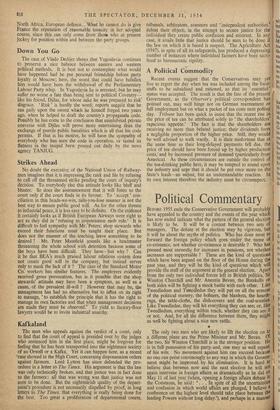A Political Commodity
Recent events suggest that the Conservatives may yet live to regret the day when tea was included among the food- stuffs to be subsidised and rationed, so that its ' essential ' status was accepted. The result is that the fate of the present Government, as the Observer's political correspondent has pointed out, may well hinge not on German rearmament or full employment but on what a packet of tea costs next polling day. Tribune has been quick to insist that the recent rise in the price of tea can be attributed solely to the shareholders' rapacious appetite.' The fact is that the shareholders are receiving no more than belated justice; their dividends form a negligible proportion of the higher price. Still, they would be well advised to walk warily. It is their misfortune that at the same time as their long-delayed payments fell due, the price of tea should have been forced up by higher production costs; and by increased pressure of demand (particularly from America). As these circumstances are outside the control of the tea-drinking public here, it may be tempted to round upon the industry and urge that it should be put once more on the State's leash—an unjust, but an understandable reaction. Iii its own interest therefore the industry must be circumspect.


























 Previous page
Previous page